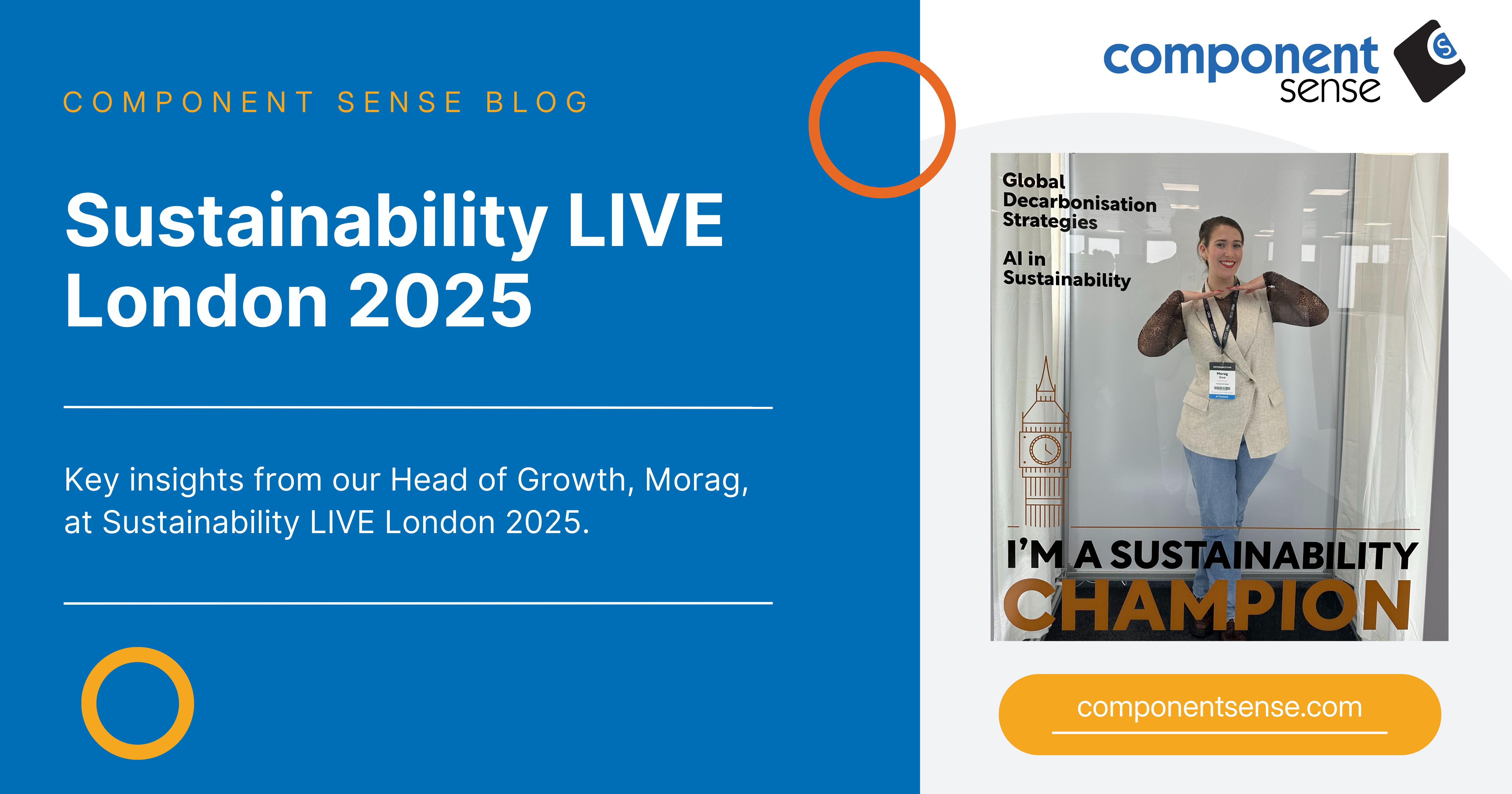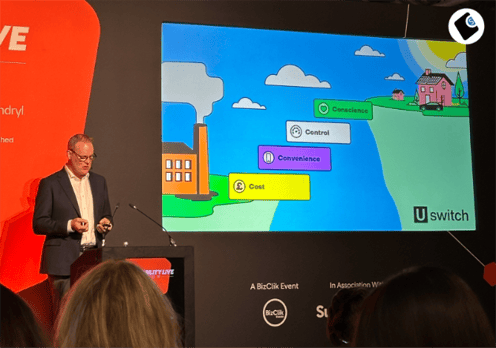Recap: Sustainability LIVE London 2025

Earlier this September, our Head of Growth, Morag Dine, attended Sustainability LIVE in London, a two-day event dedicated to accelerating sustainable business practices. With thought leaders and experts from across global industries, the event emphasised the importance of sustainability for businesses to stay competitive, resilient, and to achieve long-term growth.
Below, we share some of the key discussions at this event and our thoughts:
Women in Sustainability
The conference opened with voices from industry leaders, including Philippine de T’Serclaes (Chief Sustainability Officer at Dassault Systèmes) and Angela Hultberg (Global Sustainability Director at Kearney), who challenged the conventional sustainability approach.

Angela Hultberg emphasised that “sustainability is about new business strategy, revenue stream creation, and resilience." This message reflects an important shift in recent times: sustainability needs to be framed as value creation and resilience, not just compliance. Businesses that fail to measure and integrate sustainability into their operations risk losing relevance.
“What gets measured gets done.”
—Angela Hultberg
The forum also reinforced the central role of data. Although passion is essential for driving change, measurable impact secures a seat at the C-suite table. And when it comes to having a voice in strategic decisions, sustainability leaders cannot wait to be invited. As Marcia Balisciano (Chief Sustainability Officer at RELX) urges, “If you’re not already on the agenda, ask to be put on the agenda. If you don’t ask, you don’t get.”
Future-Proofing Business
The theme of sustainability as a competitive advantage was reinforced in this workshop led by Katie Mills (Enterprise Software Director at Schneider Electric). The message was simple: businesses that fail to adapt will face higher costs, financially and reputationally.
Sam Alvis (Head of Energy Security and Environment at IPPR) added, “doing business as usual has costs as well.” Choosing not to innovate is a detriment that accumulates risks over time.
The Path to Net Zero
Next on the agenda was Steve Smith’s (Head of Global Marketing at Schneider Electric) compelling session on reframing the energy transition from fossil fuels to renewable energy during our generation. Humanity has long existed in what he described as the Age of Fire, which is reliant on fossil fuels. The urgent task for us, now, is to transition into the Age of Electric (renewable energy).
“Having a plan is simpler than you think.”
—Steve Smith
Smith argued that the path to net zero is less complex than many believe. The guiding principle is straightforward:
Strategise → Digitise → Decarbonise
This framework of Electricity 4.0 represents the future of energy, combining digital and electric at scale.
Carbon Intelligence and Circular Strategy
Florian Renneberg (Sustainability Expert Team Leader at Carbmee) explored the growing complexity of carbon intelligence within supply chains. The further down the chain you are, the harder is it to gather accurate data and create actionable strategies.
There was discussion circling around Emission Trading Systems (ETS) and whether carbon could become the new global currency. Jane Goodland (Head of Sustainability at LSEG) noted that if the green economy were categorised as its own sector, it would be the world’s fourth-largest industry. However, it is not its own field because sustainability is found everywhere. Sustainability cannot be siloed; it requires collaboration and transparency across the value chain.
Mass-Market Adoption of Sustainable Solutions
One question posed at Sustainability LIVE was how to take sustainable innovation from niche adoption to mass-market integration. Angus McCarey (CEO of USwitch) outlined the “Diffusion of Innovations” model and identified the four Cs necessary for adoption: Cost, Convenience, Control, and Conscience.

Pragmatic in his advice, McCarey urged businesses to “stop asking people to care and show them instead how to save.” For businesses, this means demonstrating the tangible benefits of sustainable practices rather than relying solely on moral arguments.
Automating Enterprise Decarbonisation
Eric Hannon (Partner of McKinsey & Company) and Hilary Tam (Sustainability Leader at AWS) discussed the evolution from target-setting to embedding decarbonisation directly into business models. Many organisations have ambitious targets, but as Hannon noted, these are often “decoupled from the reality of the business.”
In other words, progress should not be delayed in pursuit of perfection.
“We can’t let perfect be the enemy of progress.”
—Hilary Tam
This is particularly relevant for industries navigating complex supply chains, such as electronics. Incremental improvements, when scaled, lead to transformative impact.
CSO Strategy Summit
 The second day of the event focused on the role of the Chief Sustainability Officer (CSO). Leaders, including Hilary Tam (AWS), Olivia Ruggles-Brise (BCD Travel), Tom Salisbury (GKN Automotive), and Davide Stronati (Nuclear Decommissioning Authority), shared insights into the qualities required to drive real change. The consensus was that great CSOs must balance passion and enthusiasm with pragmatism. They must be effective translators and communicators who can galvanise stakeholders across all levels of a business. Authenticity and data-driven communications are the best defences against both greenwashing and “green hushing.”
The second day of the event focused on the role of the Chief Sustainability Officer (CSO). Leaders, including Hilary Tam (AWS), Olivia Ruggles-Brise (BCD Travel), Tom Salisbury (GKN Automotive), and Davide Stronati (Nuclear Decommissioning Authority), shared insights into the qualities required to drive real change. The consensus was that great CSOs must balance passion and enthusiasm with pragmatism. They must be effective translators and communicators who can galvanise stakeholders across all levels of a business. Authenticity and data-driven communications are the best defences against both greenwashing and “green hushing.”
As one speaker put it, “If you are just compliant now, you are already behind.” Compliance is the baseline; strategy, collaboration, and innovation are the differentiators.
Turning Waste into Opportunities
Closing the two-day event, Dr. Adam Read MBE (Chief Sustainability Officer at SUEZ) illustrated waste as both a resource and a financial opportunity. He noted that whilest most people get it right some of the time, consistency is the challenge. For businesses, this translates into an opportunity to create structured waste streams that add value rather than incur cost.
This principle underpins Component Sense’s commitment to circularity in the electronics industry, ensuring excess and obsolete (E&O) components are recovered and distributed rather than discarded or scrapped.
Our Takeaways
Through each workshop and event at Sustainability LIVE, there was one clear message being passed around. Sustainability is no longer an afterthought. It is a core element of business resilience, profitability, and innovation. It is a driver of shareholder value. The discussions reflected the urgent need for organisations to act with clarity and conviction.
These insights affirm our mission at Component Sense: to deliver sustainable solutions and champion a circular economy. Our zero-waste approach entails distributing E&O electronic components to our clients for manufacturing that would otherwise end up in landfills. Additionally, we are committed to environmental stewardship by planting two trees for every order placed with us and offsetting all our carbon emissions.
We are proud to contribute to the global conversation on sustainability and even prouder to act on it.